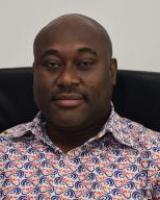The Director of the West African Centre for Cell Biology of Infectious Pathogens (WACCBIP), Professor Gordon Akanzuwine Awandare has been confirmed as the University of Ghana's Pro Vice Chancellor, Academic and Student Affairs.
Professor Awindare's appointment will take effect on January 1, 2022, during the 2021/2022 academic year.
Information available on the University's website indicates that "Council, at its meeting held on 23rd December, 2021, considered and approved the appointment of Prof. Gordon Akanzuwine Awandare as Pro Vice-Chancellor, Academic and Student Affairs (ASA) with effect from 1st January, 2022"
His appointment became necessary after his predecessor, Professor Nana Aba Appiah Amfo, was appointed as the new Vice Chancellor of the University of Ghana.
Professor Awandare will serve a three year tenure after which he'll be eligible for a second term of office.
Profile of Professor Gordon Akanzuwine Awandare
Gordon Akanzuwine Awandare is a Ghanaian parasitologist, Professor at the University of Ghana and Director of the West African Center for Cell Biology of Infectious Pathogens (WACCBIP). He is the current interim chairman of the CKT-UTAS Governing Council and the Africa Global Editor of the Experimental Biology and Medicine (EBM) journal.
Gordon Awandare was born in Kandiga, a small village in North-Eastern Ghana. During childhood, he contracted malaria several times a year, at a time when treatment for the disease was scarce.
Awandare was awarded a BSc in Biochemistry in 1998 and an MPhil in Biochemistry in 2002 from the University of Ghana.
In 2007, he graduated with a PhD in Infectious Diseases and Microbiology from the School of Public Health, with a thesis on severe malarial anemia.
Following his doctoral studies, he spent three years at the Walter Reed Army Institute of Research (Maryland, USA), where he continued studying malaria, focusing on the Plasmodium falciparum parasite.
He returned to the University of Ghana in 2010 to establish his own research group. Without start-up funding, he used US credit cards to support his work whilst applying for grants, and two years later received funding from both the Royal Society and the National Institutes of Health.
Latest Stories
-
Two-time Wimbledon champion Kvitova to retire
2 hours -
Sinner suffers worst loss by ranking since 2023
3 hours -
Maresca yet to speak to Mudryk after anti-doping charge
3 hours -
Leverkusen set to accelerate Quansah interest
3 hours -
Palmeiras beat Al Ahly after 40 minutes weather delay
3 hours -
Manchester City fined £1m for repeatedly delaying kick-off
3 hours -
Real Madrid forward Mbappe released from hospital
4 hours -
‘Touched by God’ – Messi shows he still has magic touch
4 hours -
Mahama directs local procurement of Free Sanitary Pads
4 hours -
‘Black Star Experience’ to start in July
4 hours -
Supreme Court ‘quashes’ High Court verdict against Abesimhene Barima Akyeaw III
4 hours -
China injects over $22.85bn into Africa, sets $134bn trade record
4 hours -
Unemployed remanded for allegedly swindling footballer of GH¢395,250
5 hours -
Dodgers say immigration agents denied entry to Los Angeles stadium
5 hours -
It’s propaganda, Ken Agyapong will win – Stephen Amoah fires Bawumia camp over MP endorsements
5 hours

